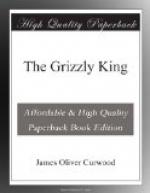PREFACE
It is with something like a confession that I offer this second of my nature books to the public—a confession, and a hope; the confession of one who for years hunted and killed before he learned that the wild offered a more thrilling sport than slaughter—and the hope that what I have written may make others feel and understand that the greatest thrill of the hunt is not in killing, but in letting live. It is true that in the great open spaces one must kill to live; one must have meat, and meat is life. But killing for food is not the lust of slaughter; it is not the lust which always recalls to me that day in the British Columbia mountains when, in less than two hours, I killed four grizzlies on a mountain slide—a destruction of possibly a hundred and twenty years of life in a hundred and twenty minutes. And that is only one instance of many in which I now regard myself as having been almost a criminal—for killing for the excitement of killing can be little less than murder. In their small way my animal books are the reparation I am now striving to make, and it has been my earnest desire to make them not only of romantic interest, but reliable in their fact. As in human life, there are tragedy, and humour, and pathos in the life of the wild; there are facts of tremendous interest, real happenings and real lives to be written about, and very small necessity for one to draw on imagination. In “Kazan” I tried to give the reader a picture of my years of experience among the wild sledge dogs of the North. In “The Grizzly” I have scrupulously adhered to facts as I have found them in the lives of the wild creatures of which I have written. Little Muskwa was with me all that summer and autumn in the Canadian Rockies. Pipoonaskoos is buried in the Firepan Range country, with a slab over his head, just like a white man. The two grizzly cubs we dug out on the Athabasca are dead. And Thor still lives, for his range is in a country where no hunters go—and when at last the opportunity came we did not kill him. This year (in July of 1916) I am going back into the country of Thor and Muskwa. I think I would know Thor if I saw him again, for he was a monster full-grown. But in two years Muskwa had grown from cubhood into full bearhood. And yet I believe that Muskwa would know me should we chance to meet again. I like to think that he has not forgotten the sugar, and the scores of times he cuddled up close to me at night, and the hunts we had together after roots and berries, and the sham fights with which we amused ourselves so often in camp. But, after all, perhaps he would not forgive me for that last day when we ran away from him so hard—leaving him alone to his freedom in the mountains.
James Oliver Curwood.
Owosso, Michigan,
May 5, 1916.




